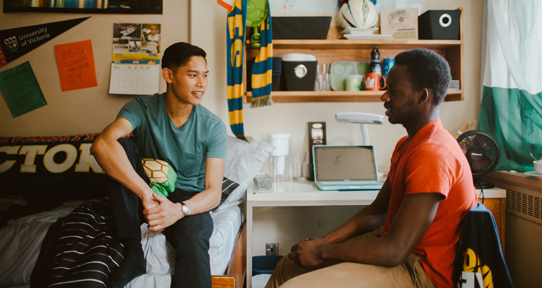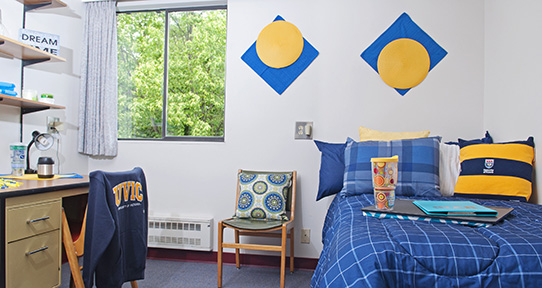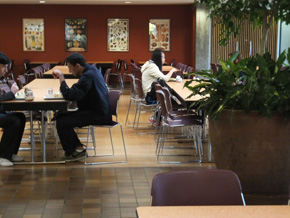On Campus or Off Campus? An In-Depth Comparison.
 So you’ve decided UVic is the school for you and you’re excited to call Victoria your home for the next 4+ years of your life. Congratulations and welcome! Now the next question becomes, where in Victoria will you reside for this journey?
So you’ve decided UVic is the school for you and you’re excited to call Victoria your home for the next 4+ years of your life. Congratulations and welcome! Now the next question becomes, where in Victoria will you reside for this journey?
Over the course of your degree you’ll likely inhabit various places and coexist with a variety of roommates. Once you start here, make friends, and familiarize yourself with Victoria’s neighbourhoods, sorting out the details of housing becomes easier and much less intimidating.
However, such reassurances don’t change the fact that you’ve got to start somewhere; likely with limited knowledge of the area, and potentially—if you’re anything like me—with a nerve-racking hyper-awareness of how few people you know in Victoria. Now that I’m done emulating your fears, let’s move on to the part of the post where I give you advice and tell you that it’s going to be okay.
Off campus or on campus?
The first decision you need to make in terms of housing is this: off campus or on campus? With on-campus housing applications having recently opened, now is as good a time as any to start thinking about this choice.
There are many factors to consider when answering this question, but the best way to approach such a choice is to break it down. After giving a brief overview of the most common housing options, I’m going to compare the pros and cons for you under financial, social and convenience.
As a fourth year student who’s lived on campus as a resident and a Community Leader, as well as off campus with friends and strangers, I hope my perspectives can offer you a wide range of considerations on the subject of housing. And in case that’s not enough, I have also collaborated with other students to give you a full range of experiences!
Your Options
On Campus
 UVic Residence Services offers a few different styles of on-campus housing: dorm rooms, cluster units, graduate apartments, and family housing.
UVic Residence Services offers a few different styles of on-campus housing: dorm rooms, cluster units, graduate apartments, and family housing.
Dormitories and cluster units are the most common housing styles on campus and are the only available option for undergraduate students.
- Dormitory buildings consist primarily of single rooms as well as some double rooms.
- Cluster units are apartment-styled housing that consist of four single bedrooms, two bathrooms, a kitchen, and a small common room. See additional descriptions on the features of these housing styles.
- Family housing options are available on campus for UVic students and their families, with or without children.
Which building is best?
Students always wonder which building’s best, but there’s no objective answer because there are so many differences between the dorms on campus.
For example, while newer buildings seem to be the most desirable, they have smaller rooms than the older buildings. Ultimately, the quality of your experience in residence really has nothing to do with the paint job, the newness of the carpet, or the size of your room. What does affect your experience in residence is the people you’re with. So my recommendation is to choose your building preferences at random and be surprised, or apply for a themed housing option and live near people with whom you share interests. Most people in residence are the same as you in that they know few people in Victoria and are looking to make friends, so you’ll have a good time no matter where you live.
“I really liked having a single room because I could have my own space, especially being on a sports team when I had a pretty rigid schedule.” – Rachel
“Res for me felt like a summer camp away from home, but instead of learning arts and crafts, we were growing up together, learning how to start off on our own two feet, and having as much fun as possible while doing so.” – Alex
“A great transition to living on your own.” – Megan
Off Campus
Since off-campus housing options include any sort of housing that is not—you guessed it—on campus, they are as numerous as they are diverse. For the most part students live—either alone or with roommates—in houses, suites or apartments. Although rental terms vary, most places are rented monthly or as a part of a longer term lease (often a year).
Finding off-campus housing arrangements that suit your unique needs can be a bit time consuming and may require patience, but rest assured that you’ll be able to find a place. Try the following websites to start your search:
- The Housing group on Facebook, where students search for roommates, short-term sublets, and other housing related needs.
- UVic’s partner Places4Students
- UsedVictoria
- Craigslist and/or Kijiji
“For [my] first couple of years at UVic I was living with a Canadian host family off campus so that I [was] able to get to know Victoria faster! For my current and last year of university, I decided to live off campus sharing a basement suite with two other girls to experience living in a different environment.” – Mana
“After the first semester [on campus] I had made friends and felt like I was ready to move on, so the second semester I felt very confined and wanted to see more of Victoria and live more independently. I love living off campus with my roommate. It’s a lot cheaper and I find I spend less money and spend more time outdoors. I’m enjoying having more space, cooking and the ability to create/decorate my own place.” – Megan
Financial
 Innate to your mere existence as a student, financial considerations carry a fair bit of weight in your decision-making, so let’s cut to the chase and avoid dancing around the subject. Approximate monthly rent costs breakdown as follows:
Innate to your mere existence as a student, financial considerations carry a fair bit of weight in your decision-making, so let’s cut to the chase and avoid dancing around the subject. Approximate monthly rent costs breakdown as follows:
- Dormitory on campus** ~ see Residence Services website
- Cluster on campus** ~ see website
- Shared accommodations off campus* ~ approx. $450-$650+
- Single accommodations off campus* ~ approx. $750+
*Off-campus housing costs vary depending on location, features, number of bedrooms, etc. These are estimates based on my experience with my own off-campus living expenses and those of friends’ expenses.
However, students who choose to live on campus must note that payments for residence fees are not paid monthly, but are paid as instalments as described on the website’s detailed fee schedule.
Food costs
 Dormitory rooms on campus are considerably more expensive than other housing options, but these costs cover meal plan expenses, so when comparing to off-campus options you need to also factor in estimated grocery costs.
Dormitory rooms on campus are considerably more expensive than other housing options, but these costs cover meal plan expenses, so when comparing to off-campus options you need to also factor in estimated grocery costs.
Grocery costs can be hard to estimate since everyone has different preferences and dietary needs. The best way to budget is to consider what you’d eat in a week, make a list of all ingredients required for your meals, and spend some time in a grocery store copying down prices until you have your estimated weekly grocery bill total. (Tip: try to shop at grocery stores based on weekly deals or loyalty reward discounts to save money; my Save-On-Foods member card has saved me hundreds of dollars on groceries!)
Security deposits
Another financial consideration worth noting is security deposits. A security deposit is an additional amount of money given to the landlord/property owner before move-in that secures your spot as a tenant. It is often paid at the same time as a contract is signed between you and the landlord.
This fee is generally half the cost of one month’s rent and will be given back to you upon move-out and after assessment of the room/apartment. The full amount of the security deposit may not be returned should any damages be found by the landlord or if you break your contract with the landlord without proper advance notice.
To avoid any unfair charges related to damage not caused by you, I recommend taking pictures of any damages (such as pushpin holes or paint scratches) upon move-in and sharing these with your landlord.
Social
 Though finances are an important consideration and estimated costs of living off-campus may be more affordable than living on campus, social considerations are also of significant importance. They may ultimately be the most influential factor of your choice to live on or off campus.
Though finances are an important consideration and estimated costs of living off-campus may be more affordable than living on campus, social considerations are also of significant importance. They may ultimately be the most influential factor of your choice to live on or off campus.
I lived in residence on campus in my first year at UVic and couldn’t have been happier with my decision. Making friends was as easy as leaving my bedroom door open and writing a friendly message on the door’s whiteboard. The friends I made in my building became like family and were always there for a good laugh or a stressed out cry. Without them my emotional roller-coaster of a first year would not have been as manageable or as memorable as it was.
If you’re thinking that residence may not be for you, there’s no need to fear, there are still plenty of ways to make friends at UVic! Join one of the 200+ clubs or 40+ course unions on campus, register for intramurals or a recreation class, volunteer, befriend coworkers at a part-time job, or say hi to someone sitting next to you in class. Orientation programs are also a really great way to meet people!
UVic is a very friendly place and you’ll find irreplaceable friends in no time, no matter where you live!
“What I loved about being in res was sharing scary and new experiences with people who also were going through the same thing.” – Rachel
“I lived on campus because I was new to the city; [I] got sick of the food but the people […] were pretty awesome.” – Tristan
“I sort of regret not going to university straight out of high school though, and living in residence, because that’s such a crucial time to make friends!” – Marilyn
Convenience
 The last major piece of the puzzle when comparing the on- and off-campus lifestyles is convenience. Living on campus is definitely more convenient for a number of reasons:
The last major piece of the puzzle when comparing the on- and off-campus lifestyles is convenience. Living on campus is definitely more convenient for a number of reasons:
- You can wake up 20 minutes before class and still manage to pull on some clothes, grab breakfast and be on time for class.
- Naps.
- Not having to carry your class/study materials around with you all day.
- If you live in the dormitories, you have a meal plan so don’t have to grocery shop, meal prep, or wash dishes.
- Naps.
- You don’t have to worry about furnishing your room or how you’re going to move a bed across town. (Some places off-campus do come furnished, but not the majority.)
- You don’t have to worry about what area of Victoria is a good place to rent.
- If you’re entering your first year of studies directly from high-school you get first-year guaranteed residence! (Double check to make sure you qualify.)
“Having the convenience of res was a great first step for moving out of home – not having to worry about paying monthly bills, cooking every meal, and transportation to school in the very beginning made figuring out how to navigate through university easier!” – Rachel
“[I] stayed on campus for convenience of travel and to try to force myself to be social. It was also convenient since first years got first dibs and I had never lived alone before. I didn’t like the building I lived in […] but I met some cool people.” – Chelsie
Though living off campus may not always be quite as convenient as living on campus, it too has its perks:
- Victoria is a fairly easy city to get around and many off-campus student housing options are within close walking distance of a direct bus line to campus, or are within comfortable walking/cycling distance to campus.
- Living further than a few strides away from classes prevents you from going back and forth between campus multiple times a day so you quickly develop better planning & time management skills.
- When you go home for the day and leave campus it’s easier to relax and feel as if you have a life outside of school (even if you really don’t…).
- Your move-out date depends on your lease and not your exam schedule. (Residence requires that you vacate your room within 24 hours of your last exam; some exceptions are available.)
- You get to choose your roommates.
- You can cook whenever you want to and don’t have to rely on cafeteria hours.
- Weekends are quiet but you can go out as you please.
- If you’re from Victoria then you get to reap the benefits of living luxuriously at home with your awesome parents!
“In fourth year I stayed with my parents in Langford. Not as convenient in terms of food, travel, and sleep but I was a lot healthier.” – Chelsie
The biggest thing to recognize when comparing on campus versus off campus is that there is no single right answer. The best way for you to find your perfect housing fit is to consider what factors are most important to you and then go for it. I’ve done my best to give you a fair comparison between the two options and I hope the information is able to answer many of your questions or reassure your doubts.
If you have found this post helpful I encourage you to share it with your friends or anyone you know who may benefit. Please comment below with any comments or questions you may still have about housing on campus versus off campus.




Kate , nicely written helpful article. Great to see comments included from other students. You might consider if editing, to advise those searching for off campus rooms to be aware of scams and to ask many questions.
Good job favourite casual
Mr. Leigh aka Commander
Thanks for your feedback Leigh! The Housing Office will miss you when you retire! 🙂
This was very helpful at comparing aspects of on campus/off campus housing for first years specifically. I did notice it leans a lot towards on campus bias, especially since it has little information about actually choosing a house outside of campus.
It is great to live within walking distance of campus, but is also fine if you’re on a bus route 4, 14, to downtown etc because they run the latest and most often and can get you back to campus.
Lots of freshies are forced to live off campus because of insufficient housing, but don’t worry about it.
Thank you so much for your feedback Snoop! Since there is so much more information regarding finding a place off campus, I wonder if it might be beneficial to write another post specifically for that. 🙂
This has been super helpful in giving insight to accommodation options! I will be joining uvic as a grad student at the end of August, and am looking for accommodations but for a very short time. If someone has information on cluster living, or contacts for apartments off campus, please feel free to shoot me an email!
Thanks!
This was helpful and puts things in perspective, I’m wondering if there’s something equally helpful for family housing??